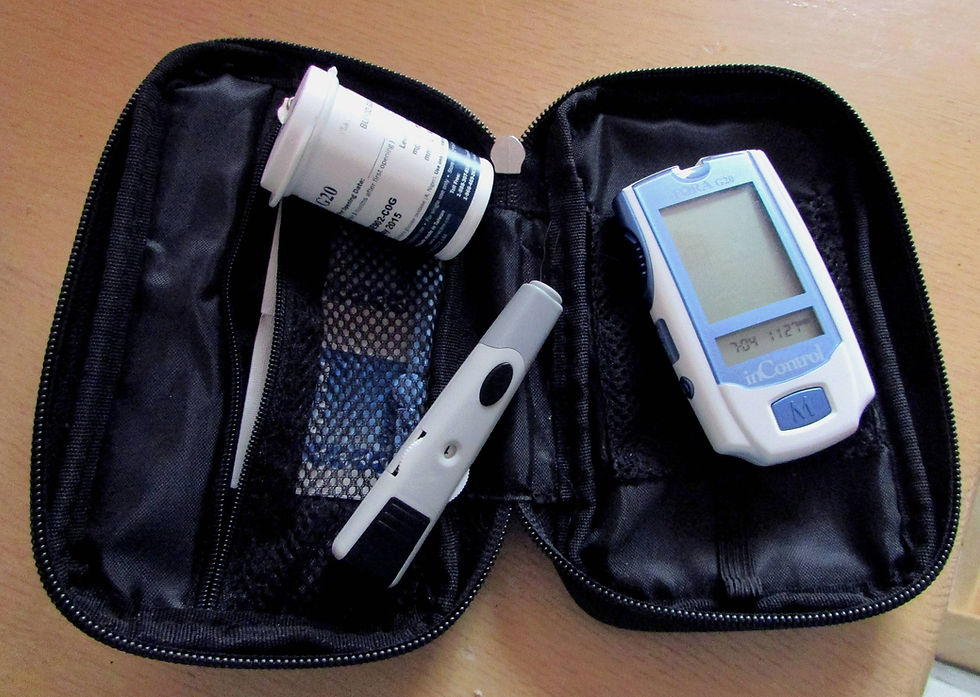Diabetic Neuropathy: How High Blood Sugar Destroys Nerves — And How You Can Prevent It
- May 20, 2025
- 4 min read

Welcome to The Health Quest, your guide to aligning with God's design for vibrant health. I’m Dr. Sal, and today we’re diving deep into a critical and often overlooked health issue: diabetic neuropathy — how it develops, why it can be so dangerous, and what you can do to prevent it.
Silent but Deadly: How Diabetes Leads to Hidden Heart Attacks
You might visit your doctor, have a normal EKG, feel fine — and still suffer a sudden fatal heart attack. This is known as a silent heart attack, often caused by cardiac autonomic neuropathy, a dangerous complication of diabetes where the nerves that control the heart and blood vessels fail.
Sadly, this is just one of the devastating effects of diabetic neuropathy — the nerve damage that arises from prolonged, poorly managed high blood sugar.
The Chain Reaction: From Sugar to Nerve Damage
Let's break it down:
Excess sugar (especially from high-fructose corn syrup and processed foods) overwhelms the body.
The liver, trying to protect the body, turns extra sugar into fat.
Fat cells expand — and when they can’t store any more fat, they rupture, spilling fat into the bloodstream.
This leads to lipotoxicity — fat clogging up organs like the liver, muscles, and pancreas.
Insulin resistance sets in: cells can no longer absorb sugar properly, causing blood sugar to skyrocket.
At first, the body pumps out more insulin to compensate. Eventually, the beta cells in the pancreas become so clogged with fat they fail, leading to full-blown type 2 diabetes.
And that’s where neuropathy — nerve damage — begins its slow, destructive march.
What Is Diabetic Neuropathy?
Diabetic neuropathy occurs when high blood sugar damages the blood vessels and nerves throughout the body.
Symptoms include:
Sharp, shooting pains
Numbness and loss of sensation, especially in the feet
Increased risk of injuries due to loss of proprioception (spatial awareness)
Cognitive decline (as brain nerves are affected)
Silent, fatal heart attacks (cardiac nerve damage)
Small injuries can turn into diabetic ulcers because tissues, starved of oxygen and nutrients, begin to die without the patient even feeling pain.
The Five Destructive Pathways of Diabetic Neuropathy
High blood sugar initiates five major biochemical pathways that devastate the nerves:
1. The Polyol Pathway
Excess glucose converts into sorbitol (a sugar alcohol) inside cells — using up critical NADPH, which the body needs to create glutathione, its master antioxidant.Result: Oxidative stress skyrockets, damaging nerves, eyes (retinopathy), and kidneys.
2. Advanced Glycation End Products (AGEs)
Glucose binds directly to proteins without enzymes, creating AGEs. These stiffen blood vessels and nerves, trigger inflammation, and contribute to plaque formation in arteries.
3. Oxidative Stress
Excess free radicals — superoxides and lipid peroxides — attack nerve tissues, DNA, and mitochondria (the cells' power plants), leading to energy failure and nerve death.
4. Fat Buildup and Dysfunction
Fat accumulation (like diacylglyceride) disrupts the critical sodium-potassium pumps in nerves, slowing nerve signals and worsening pain or numbness.
5. Essential Fatty Acid Impairment
Diabetics can't properly convert fatty acids into gamma-linolenic acid (GLA) — a crucial nutrient for nerve repair and function. Without GLA, nerves break down faster.
How to Protect and Heal Your Nerves
Managing diabetic neuropathy isn't just about symptom relief — it's about stopping the root causes.Here’s how:
1. Cut the Sugar
Eliminate or drastically reduce processed sugars and high-fructose corn syrup.
Eat low-glycemic, whole foods to stabilize blood sugar.
2. Eliminate Bad Fats
Avoid hydrogenated oils, vegetable oils (canola, soybean), and trans fats.
Choose healthy fats like olive oil, coconut oil, and omega-3 rich foods (like wild-caught fish).
3. Support with Targeted Nutrients
Alpha-lipoic acid (ALA): A powerful antioxidant shown to protect nerves from oxidative stress.
Evening primrose oil: A rich source of GLA to rebuild nerve membranes and improve nerve function.
Note: Always consult your doctor before starting new supplements.
4. Improve Circulation
Regular exercise increases blood flow to nerves.
Proper hydration and clean, mineral-rich water support vascular health.
Final Thoughts: Healing in Alignment with God's Design
The solution to diabetic neuropathy — and so many chronic diseases — is not synthetic or complicated.It lies in returning to the natural foods and rhythms God designed: real food, clean living, and holistic healing.
As I often say, "God always put the cure in the foods that we eat."
Your health is your calling. With awareness, action, and God's wisdom, you can restore your vitality and protect your future.
Thank you for reading today’s The Health Quest blog!
If you found this information helpful, please leave a review and connect with us on social media. For any health-related questions, feel free to reach out via email.
Take care and stay healthy!
Disclaimer: This blog is for informational purposes only and is not a substitute for professional medical advice.
I hope this message resonates with you and inspires you to take steps toward a life of health and purpose. Each blog post is backed by research, helping you align your health with a disciplined, purpose-driven life. Please share your thoughts, leave a review, or reach out with any questions. May this journey bring you closer to the health and vitality God intends for you. For more information watch my video on 12 Steps to Health Restoration.
God bless,
Dr. Sal









Comments